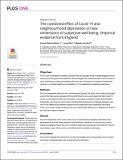Files in this item
The combined effect of Covid-19 and neighbourhood deprivation on two dimensions of subjective well-being : empirical evidence from England
Item metadata
| dc.contributor.author | Bonomi Bezzo, Franco | |
| dc.contributor.author | Silva, Laura | |
| dc.contributor.author | Van Ham, Maarten | |
| dc.date.accessioned | 2021-07-26T10:30:09Z | |
| dc.date.available | 2021-07-26T10:30:09Z | |
| dc.date.issued | 2021-07-23 | |
| dc.identifier | 275067826 | |
| dc.identifier | 8288546d-4881-4837-bfd8-b93dd77cd3d6 | |
| dc.identifier | 85111115193 | |
| dc.identifier | 000678128300038 | |
| dc.identifier.citation | Bonomi Bezzo , F , Silva , L & Van Ham , M 2021 , ' The combined effect of Covid-19 and neighbourhood deprivation on two dimensions of subjective well-being : empirical evidence from England ' , PLoS One , vol. 16 , no. 7 , e0255156 . https://doi.org/10.1371/journal.pone.0255156 | en |
| dc.identifier.issn | 1932-6203 | |
| dc.identifier.other | ORCID: /0000-0002-2106-0702/work/97884770 | |
| dc.identifier.uri | https://hdl.handle.net/10023/23624 | |
| dc.description | Understanding Society is an initiative of the Economic and Social Research Council and various Government Departments, with scientific leadership by the Institute for Social and Economic Research, University of Essex, and survey delivery by NatCen Social Research and Kantar Public. The research data are distributed by the UK Data Service. | en |
| dc.description.abstract | Objectives The Covid-19 pandemic is hitting societies hard, and people living in disadvantaged circumstances are among the most affected. We investigate the combined effects of the Covid-19 crisis and living in a deprived neighbourhood on two dimensions of subjective well-being: hedonic (i.e. mental health) and evaluative (i.e. life satisfaction) subjective well-being. Methods We use longitudinal data from the Understanding Society UK panel. We combine data gathered in the main survey between 2015 and 2019 with very recent data from the Covid-19 online survey between April and July 2020. Leveraging a sample of nearly 9,600 English individuals, we first run a set of cross-sectional OLS regressions to analyse changes over time in the relationship between neighbourhood deprivation and subjective well-being. Then, as our main model of interest, we use a fixed effect difference-in-differences model to provide more robust evidence. Results Since the beginning of the crisis, both levels of hedonic and evaluative well-being have decreased as a result of the pandemic and lockdown. However, for those living in more deprived neighbourhoods the level of hedonic well-being decreased more than for those living in better areas. We found no such difference for evaluative well-being. Conclusion Our results highlight the importance of reducing neighbourhood inequalities as the spatial clustering of disadvantages has increased by the pandemic. | |
| dc.format.extent | 19 | |
| dc.format.extent | 840556 | |
| dc.language.iso | eng | |
| dc.relation.ispartof | PLoS One | en |
| dc.subject | COVID-19 | en |
| dc.subject | HN Social history and conditions. Social problems. Social reform | en |
| dc.subject | RA0421 Public health. Hygiene. Preventive Medicine | en |
| dc.subject | 3rd-DAS | en |
| dc.subject | SDG 3 - Good Health and Well-being | en |
| dc.subject | MCC | en |
| dc.subject.lcc | HN | en |
| dc.subject.lcc | RA0421 | en |
| dc.title | The combined effect of Covid-19 and neighbourhood deprivation on two dimensions of subjective well-being : empirical evidence from England | en |
| dc.type | Journal article | en |
| dc.contributor.institution | University of St Andrews. Population and Health Research | en |
| dc.contributor.institution | University of St Andrews. School of Geography & Sustainable Development | en |
| dc.identifier.doi | https://doi.org/10.1371/journal.pone.0255156 | |
| dc.description.status | Peer reviewed | en |
This item appears in the following Collection(s)
Items in the St Andrews Research Repository are protected by copyright, with all rights reserved, unless otherwise indicated.

